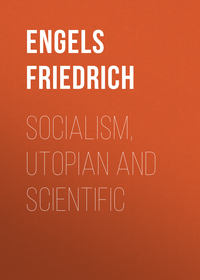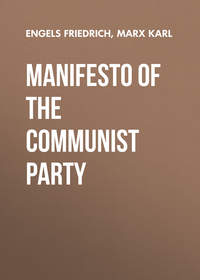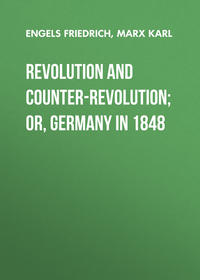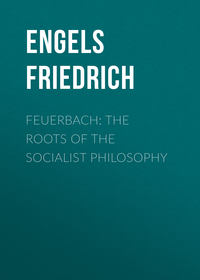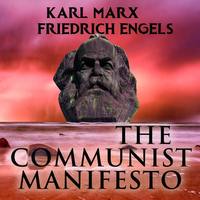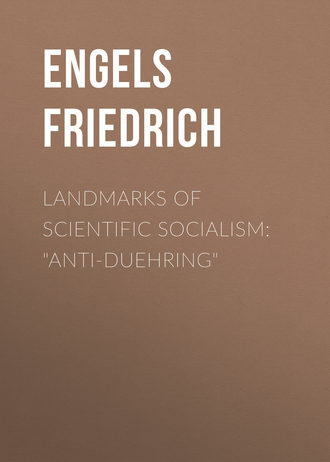 полная версия
полная версияLandmarks of Scientific Socialism: "Anti-Duehring"
When Herr Duehring therefore undertakes to distinguish life narrowly and strictly, he gives four mutually contradictory modes of distinguishing life, one of which condemns not only the whole of plant life but about half the animal kingdom to eternal death. No one can accuse him of having deceived us when he promised us peculiar results based on individual ideas.
In another place he says "There is a simple fundamental type in nature belonging to all organisms from the lowest to the highest" and this type is to be met "in the subordinate movements of the most undeveloped plants." This is again an absolutely false statement. The simplest type in the whole of organic nature is the cell, and it lies universally at the foundation of the highest organisms. On the other hand there is a substance among the lowest organisms lower even than the cell, the protomoeba, a single piece of undifferentiated protoplasm, without any differentiation, a complete series of monads and the entire class of siphoneae. All of these are connected with the higher organisms only by virtue of the fact that protoplasm is its substantial foundation, and that they fulfill the functions of protoplasm, that is they live and die.
Further Herr Duehring tells us "physiologically the concept of existence consists in this, that it embraces a single nerve apparatus. Sensation is therefore the characteristic of all animal organisms that is the capacity of conscious subjective recognition of circumstances. The sharp line of differentiation between plants and animals consists in the leap to sensation. This distinguishing line cannot any more be abolished by known forms of transition than it can be brought into existence by the logical necessity of externally distinguishable characteristics." And further "Plants are totally and eternally without sensation and are devoid of the faculty for it."
In the first place Hegel says that "sensation is the specific differentiation, the distinguishing mark of the animal." Thus one of Hegel's erudite statements becomes an indubitable truth of the last instance merely by being copied into Herr Duehring's book.
In the second place we now arrive for the first time at the forms of transition between animals and plants. That these intermediate forms exist, that there are organisms concerning which we are unable to say flatly whether they are plants or animals, that we are therefore unable to fix accurately the frontiers between plant and animal life, all these things make Herr Duehring logically anxious to fix a decisively distinguishing line, which in the next breath he declares cannot be thoroughly relied on. But there is no need for us to go to the doubtful region; intermediate between plants and animals are sensitive plants which at the least contact fold their leaves or close their petals. Are insect eating plants utterly without sensation? Even Herr Duehring cannot make such an assertion without indulging in "unscientific half-poetry."
In the third place Herr Duehring is again giving free rein to his imagination when he says that sensation is psychologically existent, even when the nerve apparatus is exceedingly simple. This is found regularly among reptiles yet Herr Duehring is the first to say that they have no sensation because they have no nerves. Sensation is not necessarily bound up with nerves but it is bound up with some albuminous substance the true nature of which has not yet been discovered.
In addition, the biological knowledge of Herr Duehring becomes exceedingly evident in that he is not ashamed to fling at Darwin the question do animals develop from plants? so that it is a question whether he is more ignorant with regard to plants or animals.
Of life in general Herr Duehring can only tell us "The change in the form of matter which fulfills itself by plastic constructive arrangement remains a distinguishing characteristic of the individual life-process."
That is all that we learn of life and with respect to the plastic creative arrangement we sink knee deep in the nonsense of Duehring's jargon. If we want to learn what life is we shall have to look at the problem a little more closely on our own account.
That organic change in matter is the most universal and distinctive evidence of life has been declared by physiological chemists and chemical physiologists times without number during the last thirty years and their utterances are translated by Herr Duehring into his own clear and elegant language. But to define life as an organic change of matter is simply to define life as life, for organic change of matter, or change of matter with plastic creative arrangement is a statement which must itself be explained by life, and the explanation in its turn by the difference between organic and inorganic, that is between that which is alive and that which is not alive. So that with this explanation we do not get at the problem.
Organic change, as such, is frequently found where life does not exist. There are whole series of processes in chemistry, which by the proper combination of the elements, produce again their own conditions, so that thereby a certain body is the creator of a process. Thus in the manufacture of sulphuric acid by the burning of sulphur, there is created in this process sulphuric dioxide SO2, and if one add steam and nitric acid thereto, the sulphuric dioxide takes up the water and the oxygen and becomes H2 SO4. Nitric acid gives off oxygen and becomes nitric oxide, this nitric oxide simultaneously takes up new oxygen from the atmosphere and is transformed into a higher oxide of nitrogen and from this acid sulphuric dioxide is again given off and made by the same process, so that, theoretically, an infinitely small amount of nitric acid should be effective to transform an unlimited quantity of sulphuric dioxide, oxygen and water into sulphuric acid. Change in matter regularly occurs through the passing of fluids through dead organic and inorganic membranes as in the artificial cells of Traube. It therefore appears that there is no progress by the way of organic change for the quality of organic change which was to explain life must itself be explained by life. We must therefore seek it elsewhere.
Life is a mode of existence of protoplasm and consists essentially in the constant renewal of the chemical constituents of this substance. Protoplasm is here understood in the modern chemical sense and comprises under this name all substances analogous to the white of an egg, otherwise called protein substances. The name is not satisfactory, for the ordinary white of egg plays the least active role of all transformed substances, since it only serves as mere nourishment for the yolk, for the self-developing germ. As long however as so little is known of the chemical constituents of protoplasm the name is better than any other because more inclusive.
Whenever we discover life we also find it bound up with protoplasm, and when we find a piece of protoplasm not in solution there we find also life, without exception. Doubtless the presence of other chemical constituents is necessary to a living body, to produce the various differentiations of these elements of life. They are not necessary to life in itself, hence they enter as food and become transformed into protoplasm. The lowest forms of life with which we are acquainted are nothing but simple pieces of protoplasm and yet they have all the appearance of living objects.
But in what consist these signs of life which are common to all living objects? In this, that the protoplasm takes from its surroundings other matter suitable to itself and assimilates it while other former portions of the body become decomposed and are thrown off. Other things, not living bodies, decompose or make combinations, but cease thereby to be what they were. The rock worn by atmospheric action is no longer rock, the metal which becomes oxidised goes off in rust. But what causes the destruction of dead bodies is the essential of the existence of living protoplasm. From the very moment when the unbroken interchange in the constituents of protoplasm ceases, the continual interchange of receiving and throwing off, from that moment the protoplasmic substance itself ceases, becomes decomposed, that is, dies.
Life, the mode of existence of protoplasmic substance, therefore consists in this, that at one and the same moment it is itself and something else, and this is not the result of a process to which it is compelled by external agency, since this may happen also with objects which are dead. On the contrary life, which is change of matter, is consequent upon nourishment and throwing off, is a self-fulfilling process inherent in its medium, protoplasm, without which it cannot exist. Hence, it follows that if chemistry should ever discover how to make protoplasm artificially, this protoplasm must show some signs of life, even if very insignificant. It is, of course, doubtful if chemistry will discover the proper food for this protoplasm at the same time as the protoplasm.
Through the changes in matter produced by nourishment and throwing off, as actual functions of the protoplasm, and through its own plasticity, proceed all the other most simple factors of life, sensibility which consists in the interchange between the protoplasm and its food, contractibility which shows itself at a very low stage in the consumption of food, possibility of growth which is shown in the lowest stages of development by splitting, and internal motion without which neither the consumption nor assimilation of food is possible.
Our definition of life is, of course, very incomplete since in order to include all the widely differing manifestations of life it must confine itself to the most universal and simple. Definitions are of little scientific worth. In order to determine what life is we must examine all forms of its manifestation from the lowest to the highest. For ordinary use such definitions are very convenient and in a certain sense indispensable, and they can do no harm as long as their inevitable deficiencies are not forgotten.
(The remainder of this section simply teases Herr Duehring.)
CHAPTER VI
MORALS AND LAW
Eternal TruthsWe refrain from offering examples of the hodge podge of stupidity and sham solemnity with which Herr Duehring regales his readers for fifty full pages as fundamental knowledge on the elements of consciousness. We merely quote the following: "He who merely conceives of thought through the medium of speech has never understood what is signified by abstract and true thought." Hence, animals are the most abstract and true thinkers, for their thought is never obscured by the importunate interference of speech. With regard to Herr Duehring's thought in particular, it may be perceived that they are but little suited to speech and that the German language in particular is quite inadequate to express them.
The fourth part of his book, however, possesses some redeeming features, for here and there it offers us some comprehensible notions on the subject of morals and law in spite of the tedious and involved rhetoric. Right at the beginning we are invited to take a journey to the other heavenly bodies. Thus, the elements of morality are to be found among superhuman beings among whom exist an understanding of things and a regular system of the harmonious conduct of life. Our share in such conclusions must then be small, but there always remains a beneficent and enlarging idea in picturing that even in other spheres individual and social life follows one purpose which cannot be escaped or evaded by any intelligent living creature.
There is good reason for our altering the position of the statement that Herr Duehring's truth is good for all possible worlds from the close to the beginning of the chapter. When once the correctness of Herr Duehring's notions of morals and law have been established so as to apply to all world the beneficent notion may easily be extended to all time. Here again, however, we run across another final truth of last instance. The moral universe has "just as well as that of universal knowledge its general principles and simple elements." Moral principles are beyond history and the national distinctions of to-day … the various truths from which in the course of development the fuller moral consciousness, and, so to speak, conscience itself is derived, can, as far as their origin is investigated, claim a similar acceptation and extent to that of mathematics and its applications. Real truths are immutable and it is folly to conceive of correct knowledge as liable to the attacks of time or of change in material conditions. "Hence the certainty of sound knowledge and the sufficiency of general acceptation forbid to doubt the absolute correctness of the fundamental principles of knowledge… Continual doubt is in itself an evidence of weakness and is merely the expression of a barren condition of confusion, which although conscious of possessing nothing still seeks to maintain the appearance of holding on to something. Regarding morals, it denies universal principles with respect to the manifold variations in moral ideas owing to geographical and historical conditions, and thinks that with the admission of the unavoidable necessity of evil and wickedness there is no need for it to acknowledge the truth and efficiency of moral impulses. This mordant scepticism which is not directed against any false doctrine in particular, but against human capacity to recognise morality resolves itself finally into nothingness, it is no more than mere nihilism. It flatters itself that it can attain supremacy and give free rein to unprincipled pleasures by destroying moral ideas and creating chaos. It is greatly deceived, however, if merely pointing at the inevitable fate of the intellect with respect to error and truth is sufficient to show by analogy that natural liability to error does not exclude the arriving at a correct decision but rather tends to that end."
Up to now we have not commented upon Herr Duehring's pompous opinions on final truths of the last instance, sovereignty of the will, absolute certainty of knowledge, and so forth, until the matter could first be brought to an issue. Up to this point the investigation has been useful to show how far the separate assertions of the philosophy of realism had "sovereign validity" and "unrestricted claim to truth" but we now come to the question if any and what product of human knowledge can have in particular "sovereign validity" and "unrestricted claims to truth." If I speak of human knowledge I do not do so as an affront to the dwellers in other worlds whom I have not the honor to know, but only because animals have knowledge also, not sovereign, however. The dog recognises a divinity in his master, who may, however, be a great fool.
"Is human thought sovereign?" Before we can answer "yes" or "no" we must first examine what human thought is. Is it the thought of an individual man? No. It exists only as the individual thoughts of many millions of men, past, present and to come. If I now say, having comprehended the thought of all men in the future also under my concept, that it is able to understand the entire universe, if man only lasts long enough, and the organs of perception are unlimited, and the objects to be comprehended have no limits upon their comprehensibility, my statement is banal and barren. The most valuable result of such a conclusion would be to cause in us a tremendous distrust of present day knowledge. Because, to all appearance, we are just standing at the threshold of human history and the generations which will correct us will be much more numerous than those whose knowledge – often with little enough regard, – we ourselves correct. Herr Duehring himself explains the necessity of consciousness, knowledge and perception only becoming apparent in a collection of separate individuals. We can only apply the word sovereignty to the thought of these individuals in so far as we do not know of any force which can defeat thought. But we all know that there is no significance to nor power of interpretation of the sovereign power of the knowledge of the thought of each individual, and, according to our experience, there is much more that requires improvement and correction in it than not.
In other words, the sovereignty of thought is realised in a number of highly unsovereign men capable of thinking, the knowledge which has unlimited pretensions to truth is realised in a number of relative blunders; neither the one nor the other can be fully realised except through an endless eternity of human existence.
We have here again the same contradiction as above between the necessary, as an absolute conceived characteristic of human thought, and its reality in the very limited thinking single individual, a contradiction which can only be solved in the endless progression of the human race, that is endless as far as we are concerned. In this sense human thought is just as sovereign as not – sovereign, and its possibility of knowledge just as unlimited as limited. It is sovereign and unlimited as regards its nature, its significance, its possibilities, its historical end, it is not sovereign and limited with respect to individual expression and its actuality at any particular time.
It is just the same with eternal truths. If mankind only operated with eternal truths and with thought which possessed a sovereign significance and unlimited claims to truth, mankind would have arrived at a point where the eternity of thought becomes realised in actuality and possibility. Thus the famous miracle of the enumerated innumerable would be realised.
But what about those truths which are so well established that to doubt them is to be, as it were, crazy? That twice two is four, that the three angles of a triangle are equal to two right angles, that Paris is in France, that a man will die of hunger if he does not receive food, etc.? Do we not perceive then that there are eternal truths, final truths of last instance? Quite so. We can divide the entire field of knowledge in the old-fashioned way into three great divisions. The first includes all the sciences which are concerned with inanimate nature and which can be treated mathematically, more or less – mathematics, astronomy, mechanics, physics and chemistry. If one like to use big words to express simple things, it may be said that certain results of these sciences are eternal truths, final truths of last instance, whence they are called the exact sciences. But all the results are by no means of this character. With the introduction of variable quantities and the extension of the variability to the infinitely small and the infinitely large, mathematics, otherwise erect, meets with its fall, it has eaten of the apple of knowledge and there has been opened up to it the path of limitless progress as well as that of error. The virgin condition of absolute purity, the undisturbable certainty of all mathematics has vanished forever, a period of controversy has intervened, and we have now arrived at the state of affairs in which most people carry on the operations of multiplication and division not because they really understand what they are engaged in, but from mere belief because the operation has so far always given correct results. Astronomy and mechanics, physics and chemistry are in a still more confused state, and hypotheses crowd one another thick as a swarm of bees. It cannot be otherwise. In physics we investigate the movements of molecules, in chemistry the development of molecules from atoms, and if the theory of light waves should not be correct we have no absolute knowledge that we even see these interesting things. The lapse of time produces a very thin crop of final truths of last instance. In geology we are in a still more embarrassing situation for we are here involved in the study of preceding epochs in which, as a matter of fact, neither we ourselves nor any other human being ever existed. Here there is much labor spent in the harvesting of truths of last instance, and they are a scanty crop withal.
The second division of knowledge is occupied in the investigation of living organisms. In this field the changes and causalities are so complex that not only does the solution of each question bring about the rise of an unlimited number of new questions, but the solution of each of these separate new questions depends upon years, frequently centuries, of investigation, and can then be only partially completed. So that the need of systematic arrangement of the various interrelations continually surrounds the final truths of the last instance with a prolific and spreading growth of hypotheses. Look at the long succession of progressive steps from Galen to Malpighi necessary to establish correctly so simple a thing as the circulation of the blood of mammals, yet how little we know of the origin of blood corpuscles and how many mistakes we make in, for example, rationally connecting the symptoms and cause of a disease. Besides there are frequently discoveries like those of the cell which compel us to entirely revise all hitherto firmly established truth of the last instance in biology, and to lay numbers of such truths aside for good and all. He who would therefore in this science undertake the proclamation of absolute and immutable truths must be content with such platitudes as the following: "All men must die; all female mammals have mammary glands, etc." He will not even be able to say that the greater animals digest their food by means of the stomach and bowels and not with the head because the centralised system of nerves in the head is not adapted to digestion.
But things are worse with regard to final truths of last instance in the third group of sciences – the historical. These are concerned with the conditions of human life, social conditions, forms of law and the state with their idealistic superstructure of philosophy, religion, art, etc., in their historic succession and in their present day manifestations. In organic nature we have at least to do with a succession of regular phenomena which regularly repeat themselves as far as our immediate observation goes, within very wide limits. Organic species have remained on the whole unaltered since the time of Aristotle. In social history, on the other hand, repetitions of conditions are the exception, not the rule, directly we leave behind the prehistoric conditions of humanity, the stone-age, so-called. Where such repetitions do occur, moreover, they never recur under precisely similar conditions, as for example the occurrence of early tribal communism among all peoples anterior to civilisation and the form of its break up. As regards human history, then, as far as science is concerned, we are at a greater disadvantage than in biology. Furthermore, when the intimate relations existing between a social and political phenomenon come to be recognised it is not, as a rule, perceived until the conditions are actually on the way to decay. Knowledge is therefore entirely relative, since it is limited to a given people and a given epoch, and their nature under transitory social and political forms, when it examines relations and forms conclusions. He who therefore is after final truths of last instance, pure and immutable, will only manage to catch flat phrases and the most arrant commonplaces, like these – man cannot, generally speaking, live without working; up to the present men have for the most part been divided into masters and servants; Napoleon died on May 5th, 1821, and things of that sort.
It is worth noting that in this department of knowledge pretended final truths of last instance are met with most frequently. Only the person who wishes to show that there are eternal truth, eternal morality, and eternal justice in human history, and that these are similar in scope and application to those of mathematics, will proclaim that twice two is four and that birds have beaks and the like to be eternal truths. We can also certainly rely upon the same friend of humanity taking the opportunity to explain that all former inventors of eternal truths have been more or less asses or charlatans, that they have been circumscribed by error and have made mistakes. The fact of their error, however, is natural and proves the existence of the truth, and that it can be reached, and the newly arisen prophet has a ready-to-hand stock of final truths of last instance, eternal law and eternal justice. This has happened hundreds, nay, thousands of times, so that it is a wonder that men are still sufficiently credulous to believe it not only of others, but even of themselves. Here we find a prophet clad in the armour of righteousness who proclaims in the old-fashioned way that whoever else may deny there is still one left to declare final truths of last instance. Denial, nay, doubt even, is a weakness, barren confusion, mole-like scepticism, worse than blank nihilism, confusion worse confounded and other little amiabilities of this sort. As with all prophets, there is no scientific investigation, but merely off-hand condemnation.




